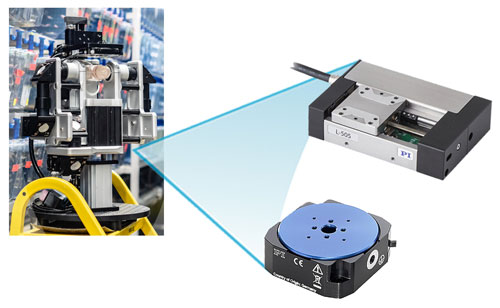| Sep 20, 2019 | |
PI's Linear and Rotary Components power ambitious FLSM project |
|
| (Nanowerk News) The ambitious Flamingo light sheet microscopy project of the research lab around Professor Jan Huisken at the Morgridge Institute for Research is supported by PI (Physik Instrumente) LP with micropositioning stages for linear and rotary motion. | |
| The precision mechanisms position and align samples in the microscopes. Dr. Thomas Bocher, Head of Segment Marketing Life Science & Microscopy at PI, is delighted that PI was invited to become one of the sponsors of this project: "The application of our precision motion systems in the Flamingo project is further proof of their high acceptance in the most demanding microscopy applications". | |
| Key factors are the compact design, reliability, high precision, and speed of the motion modules. | |
 |
|
| Physik Instrumente supports ambitious microscopy project at Morgridge Institute for Research. | |
PI linear & rotary components support LSFM |
|
| "We aim to democratize high-end light microscopy, bringing it to campuses and labs for free," explains Professor Jan Huisken, co-inventor of light sheet microscopy and Director of the Medical Engineering Department at the Morgridge Institute for Research in Madison, WI. The project, which is supported by several sponsors, turns the idea of central research facilities upside down and makes travelling with sensitive samples obsolete. | |
| Up to now, two complete systems have been set up; for the coming months and years, Huisken and his team are planning to build several dozen Flamingo-type microscopes. The name derives from the shape of the basic version of the microscope, which reminds us of the bird standing on one leg. | |
Light Sheet Microscopy |
|
| In Light Sheet Fluorescence Microscopy (LSFM), illumination and detection are two separate optical systems that are oriented perpendicular to each other. A laser beam is focused to form a light sheet that illuminates a thin plane within the sample. The fluorescent light that is emitted in this plane is captured and detected by an objective lens. | |
| "LSFM is a very powerful and flexible platform for gentle in vivo imaging, offering low phototoxicity, and fast image acquisition," Jan Huisken summarizes the advantages of the technology. | |
| Because of the gentle "treatment" of the sample, LSFM is predestined for the examination of living organisms. | |
| For more details, visit our blog post. | |
About the Huisken Lab at the Morgridge Institute for Research |
|
| The Huisken Lab is creating tailor-made optical microscopes to non-invasively explore morphogenesis and function in living organisms. The Morgridge Institute for Research is an independent biomedical institute exploring uncharted scientific territory to discover tomorrow’s cures. | |
About PI |
|
| PI manufactures precision motion control equipment for OEM and research in industries including microscopy, photonics, semiconductor & laser technology, life science, aerospace, and astronomy. PI has been developing and manufacturing standard & custom precision products with piezoceramic and electromagnetic drives for 4 decades. The company has been ISO 9001 certified since 1994 and provides innovative, high-quality solutions for OEM and research. The PI group employs more than 1,300 people worldwide in 15 subsidiaries and R&D / engineering centers on 3 continents. |
| Source: PI (press release) |
Subscribe to a free copy of one of our daily
Nanowerk Newsletter Email Digests
with a compilation of all of the day's news.
Nanowerk Newsletter Email Digests
with a compilation of all of the day's news.
